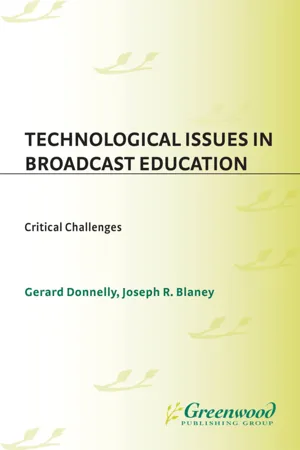
Technological Issues in Broadcast Education
Critical Challenges
- 240 pages
- English
- PDF
- Available on iOS & Android
Technological Issues in Broadcast Education
Critical Challenges
About this book
The broadcasting industry's ongoing transition to digital technology raises significant questions for higher education, ones relating to appropriate curriculum design, the teacher/student relationship, legal issues, media convergence, and funding. This new collection of essays offers guidance to faculty, administrators, and scholars alike, offering innovative ideas on ways in which programs can excel in each area. In so doing, Technological Issues in Broadcast Education illuminates the educational settings that have been created and enhanced by the emergence of new broadcast-related technologies as well as the impact of these technologies on the missions of broadcasting programs. Subjects covered in the volume include the digital revolution, curriculum revisions, online learning, gender considerations, learning beyond the classroom, and international models of broadcasting curricula. At the same time that emphasis is placed on the challenges posed by new technologies, careful attention is given to the importance of educators' continuing to emphasize the traditional academic skills of writing, interpersonal communication, and analysis. In this way, editors Jerry Donnelly and Joseph R. Blaney offer offers a unique roadmap to educators charged with shaping broadcasting programs in light of new technology.
Information
Table of contents
- Contents
- Acknowledgments
- Introduction
- Chapter 1 New Radio-TV Technologies and "The Digital Perception"
- Chapter 2 Old and New Teaching Skills in the Digital Age: A Layperson's Guide
- Chapter 3 Using Student Fees for Equipment Maintenance and Replacement: The University of North Texas Experience
- Chapter 4 Teaching Electronic Media: How Much to Change?
- Chapter 5 Technology and Academic Collaboration: An Interdisciplinary Model
- Chapter 6 Bridging Academic and Professional Cultural Barriers in a Multimedia Reporting Class
- Chapter 7 The Changing of Teaching-Learning Relationships in the Classroom: Exploring the Transition to Teaching Digital Technologies
- Chapter 8 Outcome Differences in Modular Versus Traditional Instruction in Audio Production Assignments
- Chapter 9 Legal Issues and Digital Technology in Broadcast Education
- Chapter 10 Examining Race and Gender in Student Use and Evaluation of New Technologies
- Chapter 11 Analog-to-Digital Conversion Considerations
- Chapter 12 Learning Beyond the Classroom: Student Stations, Internships, and Distance Education
- Chapter 13 Characteristics of Broadcasting Curricula: Perspectives from Three Continents
- Conclusion
- Index
- About the Editors and Contributors
Frequently asked questions
- Essential is ideal for learners and professionals who enjoy exploring a wide range of subjects. Access the Essential Library with 800,000+ trusted titles and best-sellers across business, personal growth, and the humanities. Includes unlimited reading time and Standard Read Aloud voice.
- Complete: Perfect for advanced learners and researchers needing full, unrestricted access. Unlock 1.4M+ books across hundreds of subjects, including academic and specialized titles. The Complete Plan also includes advanced features like Premium Read Aloud and Research Assistant.
Please note we cannot support devices running on iOS 13 and Android 7 or earlier. Learn more about using the app